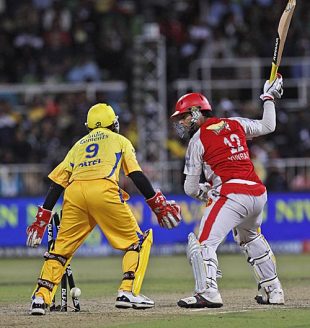Chennai Super Kings v Kings XI Punjab, IPL, Durban
Chennai deal Punjab killer blow in low-scorer
May 20, 2009
Chennai Super Kings 116 for 9 (Parthiv 32, Sreesanth 2-23) beat Kings XI Punjab 92 for 8 (Pomersbach 26, Murali 2-8, Ashwin 2-13) by 24 runs

| ||
| | ||
It didn't rain runs in either of the two matches at Kingsmead but there was no shortage of entertainment value as the bowlers called the shots in what is regarded as a sloggers' game. When Chennai Super Kings limped to what looked like a barely defendable 116, Kings XI Punjab trooped off with the belief that a confirmed semi-final berth was just an hour-and-a-half away. But they were treated to a harsh lesson by Chennai's spinners, led by the wily Muttiah Muralitharan, and never at any stage since their introduction did Punjab look like matching the mounting asking rate.
The stern test couldn't have come at a worse time for Punjab, who after this defeat, became the favourites not to make the semi-finals. Chennai were virtually in the top four before this match but the 24-run win only tightened their grip at second place.
MS Dhoni, at the toss, justified the addition of an extra offspinner by pointing to the number of left-handers in the line-up. The strategy worked as the trio of offspinners - Muralitharan, R Ashwin and Suresh Raina - choked the runs and forced them into taking risks. The figures tell the story - their combined quota of 12 overs cost only 38 runs and yielded six wickets.
The most decisive phase in the chase was Muralitharan's spell. He came in when Chennai conceded 13 off an over by Thilan Thushara - the most expensive of the innings - and struck soon with the wicket of Simon Katich, who lost his legstump after shuffling across too far. The ball gripped, stopped on the batsmen and on the whole made scoring very difficult. The array of left-handers struggled to milk the singles, let alone find the odd boundary and went into their shell by shouldering arms.
Sensing the truckload of pressure the batsmen had been putting on themselves, Dhoni, interestingly, didn't over-attack the batsmen and instead placed fielders at the boundary, trying to tempt the batsmen into hitting out. Though the boundary riders came into play only towards the fag end of the innings, the pressure tactics applied by Dhoni contributed to Punjab's capitulation.
Even Yuvraj Singh was rendered clueless, plodding around for 18 deliveries for his six before he backed away in desperation and lost his stumps to a shooter from Suresh Raina. Punjab earlier pinned their hopes on Luke Pomersbach - one among only two batsmen to cross double figures - but he too fell to the spinners, edging Murali to slip.
| |||
In the five-over passage before the time-out, Punjab managed only 16 runs. Now with the loss of those two wickets, plus the fall of Kumar Sangakkara, the run-rate dipped to three an over, unimaginable by Twenty20 standards. None of the three spinners looked easy to get away. Murali used flight and got it to grip and turn; Raina bowled a much flatter trajectory and forced the batsmen to check using their feet; Ashwin relied on bowling a more stump-to -stump line. The frustration of not being able to put away the only spinner in the trio without international experience forced Sangakkara into chipping one back to Ashwin.
From there, the innings was a freefall and there was an air of inevitability to the result by the 15th over. Punjab's capable lower-order hitters couldn't quite turn the script around, and it was all over when 32 was needed off the final over.
The worried faces at the dugout was in sheer contrast to when the inimitable Sreesanth nearly scaled the entire perimeter of the outfield in celebration after pegging back Dhoni's offstump with an inswinging yorker. Back then, Punjab had Chennai in a spot of bother at 70 for 4 in the tenth over, wrecking a brisk opening stand of 40 between George Bailey and Parthiv Patel.
Their stand was the only passage of play in the entire match which witnessed some fluency in the strokeplay. They lost control when Ramesh Powar came on in the fifth over, which brought a run-out. Powar was just as effective as Chennai's spinners, keeping the runs down and applying pressure on the batsmen to build on the opening stand.
Sreesanth's double-strike dented Chennai further and it reflected in the way the lower order failed to push the scoring. They swung their bats at everything, made room to improvise and managed only two fours and a six in the last ten overs, which yielded 46 runs. Punjab managed only twice the number of fours in their entire innings. The gulf between the two sides was, however, much wider than those figures indicate.

